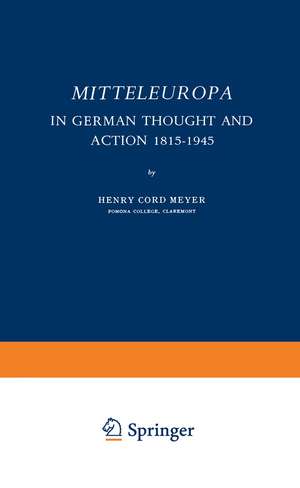Mitteleuropa: In German Thought and Action 1815–1945: International Scholars Forum, cartea 4
Autor Henry Cord Meyeren Limba Engleză Paperback – 1955
Din seria International Scholars Forum
-
 Preț: 393.13 lei
Preț: 393.13 lei -
 Preț: 383.93 lei
Preț: 383.93 lei -
 Preț: 390.84 lei
Preț: 390.84 lei -
 Preț: 378.71 lei
Preț: 378.71 lei -
 Preț: 386.61 lei
Preț: 386.61 lei -
 Preț: 383.12 lei
Preț: 383.12 lei -
 Preț: 385.62 lei
Preț: 385.62 lei - 15%
 Preț: 634.49 lei
Preț: 634.49 lei -
 Preț: 389.49 lei
Preț: 389.49 lei -
 Preț: 381.81 lei
Preț: 381.81 lei -
 Preț: 377.95 lei
Preț: 377.95 lei -
 Preț: 393.90 lei
Preț: 393.90 lei -
 Preț: 382.57 lei
Preț: 382.57 lei -
 Preț: 377.95 lei
Preț: 377.95 lei
Preț: 393.90 lei
Nou
Puncte Express: 591
Preț estimativ în valută:
75.38€ • 80.60$ • 62.84£
75.38€ • 80.60$ • 62.84£
Carte tipărită la comandă
Livrare economică 18 aprilie-02 mai
Preluare comenzi: 021 569.72.76
Specificații
ISBN-13: 9789401513616
ISBN-10: 9401513619
Pagini: 396
Ilustrații: XV, 378 p.
Dimensiuni: 155 x 235 x 21 mm
Greutate: 0.55 kg
Ediția:Softcover reprint of the original 1st ed. 1955
Editura: SPRINGER NETHERLANDS
Colecția Springer
Seria International Scholars Forum
Locul publicării:Dordrecht, Netherlands
ISBN-10: 9401513619
Pagini: 396
Ilustrații: XV, 378 p.
Dimensiuni: 155 x 235 x 21 mm
Greutate: 0.55 kg
Ediția:Softcover reprint of the original 1st ed. 1955
Editura: SPRINGER NETHERLANDS
Colecția Springer
Seria International Scholars Forum
Locul publicării:Dordrecht, Netherlands
Public țintă
ResearchCuprins
I. Fiction and Fact: An Introduction.- II. Mid-European Aspects of German Nationalism, 1815–1871.- Precursors of Mitteleuropa.- The Contest for German Unity in its Mid-European Setting.- The Eclipse of the Grossdeutsch Movement.- III. The Slender Threads.- The Mitteleuropa of Lagarde.- The Hapsburg Dilemma.- The Austrian-Germans Between Sadowa and Sarajevo.- Reich-German Reactions to the Austrian-German Dilemma.- IV. Germany and Middle Europe: The Economic Pattern, 1871–1914.- Unfulfilled Dreams of Mid-European Economic Integration.- The Pattern of German Investment.- The Expansion of German World Trade.- Waterways and Rails in Middle Europe, and the Movement of German Trade.- V. Mitteleuropa in the Age of William II.- The Wilhelmian Scene.- Naumann’s Pre-war Emphases.- Pre-war Enthusiasm for the Near East: Paul Rohrbach and Ernst Jäckh.- Pre-war Objectives of German Diplomacy.- Mid-European Themes in the Wilhelmian Era.- VI. The Impact of Blockade.- Pre-war Intimations of Siege.- Initial Reactions to Blockade.- The Siege and the Powers.- The War Aims of the Central Powers.- VII. Mitteleuropa Emerges.- The First Evidences.- How Mitteleuropa Grew.- The Rising Flood.- The Economic Argument.- The Economic Interests.- Cross-Currents and Quandary.- VIII. The Austro-Hungarian Dilemma 174 Austrian-German Plans to Reorganize the Monarchy.- Austro-Hungarian Resistance to Mitteleuropa.- Stalemate and Perplexity.- IX. Friedrich Naumann’s Mitteleuropa.- Naumann’s Argument.- Reactions at Home and Abroad.- Naumann, the Entente, and the German Government.- X. 1916. The Year of Culmination.- The Greater Mid-European Illusion.- The Peak of Mitteleuropa Enthusiasm.- The Pan-Germans vs. Mitteleuropa.- Weltwirtschaft Opposes Mitteleuropa.- Mitteleuropa Refortified.- Geographyand History Adjust to Mitteleuropa.- XI. Mitteleuropa in Eclipse.- Intimations of a Totalitarian Future: The Ludendorff Dictatorship.- The German ‘Discovery’ of Russia.- Osteuropa Overshadows Mitteleuropa.- The Weakening of Mitteleuropa.- Mitteleuropa Stillborn.- Implications of the Eclipse.- XII. Retreat and Mutation, 1918–1945.- The Grossdeutsch Revival.- Grossdeutsch Feeling Gives Way to Gesamtdeutsch Ambition.- The New Economic Mitteleuropa.- Mitteleuropa and Nazi Ideology.- XIII. Conclusion.- XIV. Bibliographical Essay.














